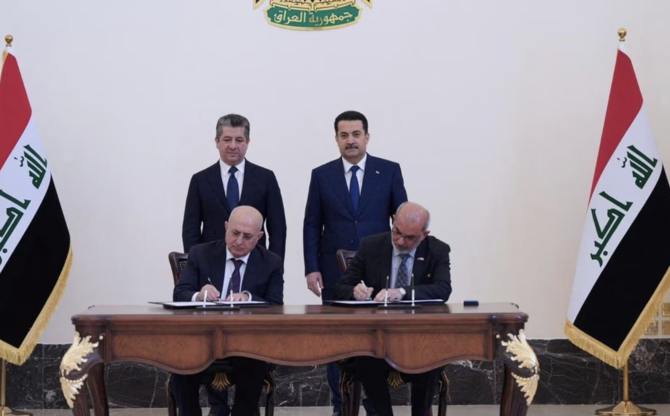Iraq thwarts oil deal between Turkiye and Iraqi Kurdistan

https://arab.news/4krxr
Iraq has won an arbitration case against Turkiye in the Paris-based International Chamber of Commerce and the flow of oil through the pipeline was stopped as of March 25.
Quoting a statement by the Iraqi government, Reuters said that Turkiye must pay $1.4 billion to Iraq, plus the interest according to the market rate.
Iraq’s original claim was $34 billion. Ankara had feared that it could be fined up to $10 billion. Therefore, it seemed relieved when the verdict was disclosed. With a view to trivializing the importance of the verdict, Turkish Minister of Energy Fatih Donmez made the following statement: “Four out of five claims put forward by Iraq are rejected. Only one of them is admitted. There were claims put forward by Turkiye. Five out of six of them are admitted. Only one of them is rejected. Time will show how this will play out.”
This statement hardly dissimulates Turkiye’s failure in the conflict. The hard fact is that Turkiye was fined and has to pay $1.4 billion to Iraq. The Turkish government has announced that it will pay that amount.
The main opposition Republican People’s Party spokesman ridiculed the government’s position by claiming that “only one of the claims of the Iraqi government was admitted.” “Don’t chew the words,” he said, “what is the amount that Turkiye has to pay to Iraq?”
The reality is that Turkiye is supposed to pay about $2 billion to Iraq and Iraq will pay about $0.6 billion to Turkiye because it did not repair the pipeline on time. Therefore, the balance is $1.4 billion.
Ankara’s optimism comes from the fact that it feared it would have to pay a much higher amount to Iraq, and it seems to be resigned to getting malaria rather than dying.
This court case covered only the oil that was exported between 2014 and 2018. Another arbitration case that covers the period of 2018 and beyond is still in process. A verdict is not expected in this second case for two years. The Turkish authorities are keeping silent on this second case.
Under a new agreement, the KRG will sell oil through the Iraqi National Oil Company and deposit the proceeds in the Iraqi Central Bank.
Yasar Yakis
Baghdad has been opposed from day one to the export of oil from northern Iraq. It said that Ankara was breaching the terms of the 1973 transit agreement by carrying oil from northern Iraq to the Turkish Mediterranean port of Ceyhan without the consent of the Iraqi central authorities. Despite this, Turkish authorities in 2014 signed a deal with the Kurdistan Regional Government to export oil through Turkiye.
Oil was carried by a Turkish company owned by Berat Albayrak, the son-in-law of Turkish President Recep Tayyip Erdogan. The Russian authorities — not on good terms with Turkiye at that time — provided the UN with pictures of oil tankers illegally carrying oil from northern Iraq to Ceyhan. The first sale of oil that was stored in Ceyhan took place on May 22, 2014. Once it arrived in Ceyhan, it was loaded onto a ship. This ship transferred oil to another ship in mid-sea, thus blurring the trace of northern Iraqi oil.
The Iraqi Oil Ministry used to underline that the only authority that was in charge of the transport of the Iraqi oil was SOMO — State Organization for Marketing of Oil — and that it was opposing the deal between Turkiye and the Kurdistan Regional Government.
The occupation of Mosul by the so-called Islamic State for Iraq and the Levant (Daesh) changed the parameters of the oil trade in Iraq. When then-Iraqi Prime Minister Nuri Al-Maliki was in trouble because of instability in Iraq, Masoud Barzani, president of the Kurdistan Autonomous Region of Iraq, agreed with the Turkish government to ship the northern Iraqi oil to Ceyhan via the existing pipeline.
Important progress was achieved on Tuesday last week. Iraqi Prime Minister Mohammed Al-Sudani, together with Masrour Barzani, the prime minister of the Kurdistan Regional Government, announced that they had decided to resume the flow of oil through the pipeline that passes through Turkiye to Ceyhan. This was good news, because it lowers the reliance on Russian oil in the international oil market.
According to the deal, the Kurdistan Regional Government will sell oil through the Iraqi National Oil Company and deposit the proceeds in the Iraqi Central Bank. This is an important step, but both Al-Sudani and Barzani admitted that this was only a temporary deal. The overarching negotiations between the Iraqi government and the Kurdistan Regional Government are still underway and there is no guarantee that the two sides will eventually sort out all their problems.
On the Turkiye-Iraq dispute, we have to wait and see the outcome of the second dispute between Turkiye and Iraq that covers the period from 2018 and beyond.
- Yasar Yakis is a former foreign minister of Turkiye and founding member of the ruling AK Party. Twitter: @yakis_yasar










































